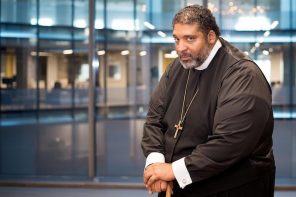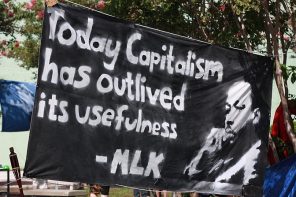I’ve known Rev. Barber very well for some time now. He has given a series of talks here at Union on the Third Reconstruction, and he’s working with Union to expand the scope of his work beyond his Southern base.
 I can say about Rev. Barber that he has this remarkable combination of deep theological knowledge, a sharpness of intellect when it comes to history, and this very practical politics. He always has very specific things to say about the kind of policy changes we need to be pursuing. The movement he’s building never lets you drift off into an amorphous idealism.
I can say about Rev. Barber that he has this remarkable combination of deep theological knowledge, a sharpness of intellect when it comes to history, and this very practical politics. He always has very specific things to say about the kind of policy changes we need to be pursuing. The movement he’s building never lets you drift off into an amorphous idealism.
Here we are, almost 150 years after the end of slavery, and what we see again and again is progressive change soon followed by reactionary backlash. The cultural aspect of the 200 years of chattel slavery and the 100 years of Jim Crow still lives on in the unconscious—sometimes conscious—lives of white Americans. And that’s what we have to defeat.
White supremacy thrives on a fear of black bodies because there is a real—but not acknowledged—fear that white people will be held responsible for what they’ve done. The fear is that they themselves will be the recipients of violence. So Barber is right in many ways to name those fears and argue for the type of fusion politics we need to be doing.
It’s just beautiful to see the kind of coalition he’s pulled together. It’s based on a blend of the issues: Healthcare, education, housing, climate change, gay rights, police violence—all of these are intersectionally linked. Because he’s so good at interlocking all these issues, he brings together such a diverse community.
Mobilizing the white, working-class community is like moving blocks of 10-ton lead, but in North Carolina he has managed to bring in the poor white community and to bring in the predominantly white labor unions.
His ability to do that is such a strong testimony, and shows that when comes to civil rights leaders, he’s the real thing.





